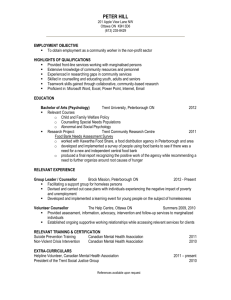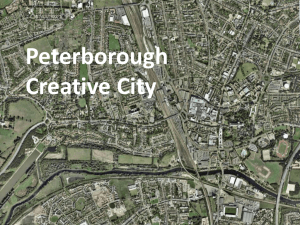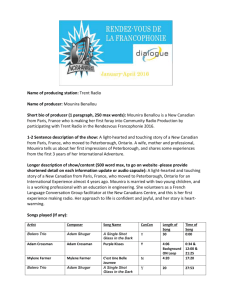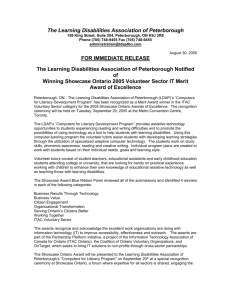Peterborough Local Studies and Archives Service
advertisement
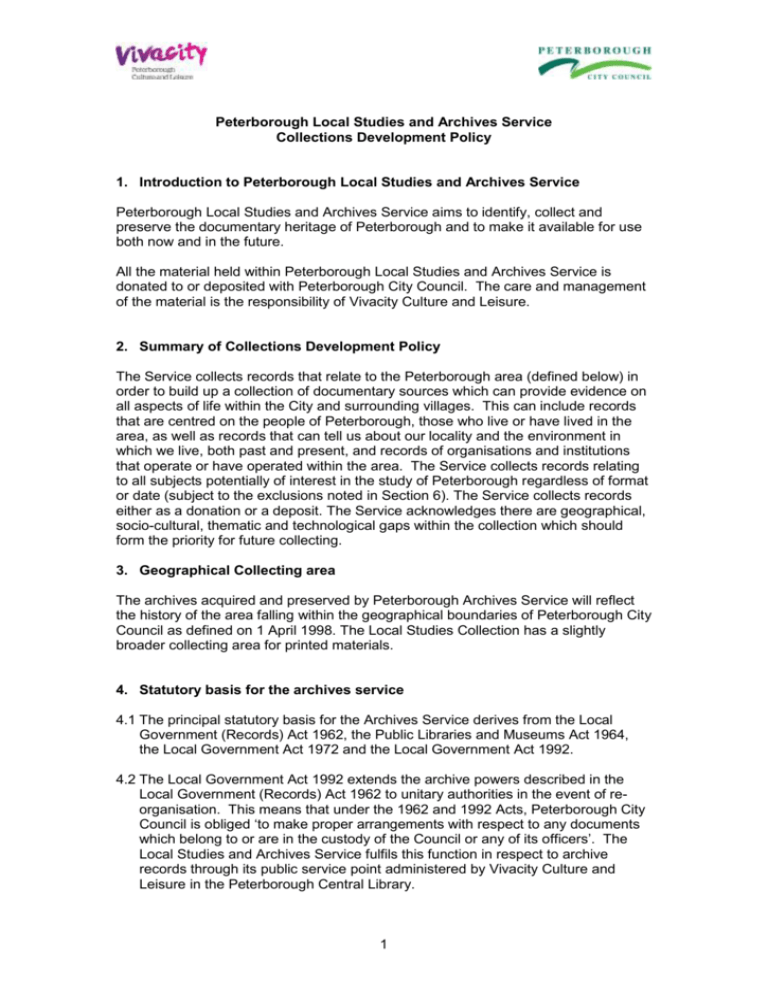
Peterborough Local Studies and Archives Service Collections Development Policy 1. Introduction to Peterborough Local Studies and Archives Service Peterborough Local Studies and Archives Service aims to identify, collect and preserve the documentary heritage of Peterborough and to make it available for use both now and in the future. All the material held within Peterborough Local Studies and Archives Service is donated to or deposited with Peterborough City Council. The care and management of the material is the responsibility of Vivacity Culture and Leisure. 2. Summary of Collections Development Policy The Service collects records that relate to the Peterborough area (defined below) in order to build up a collection of documentary sources which can provide evidence on all aspects of life within the City and surrounding villages. This can include records that are centred on the people of Peterborough, those who live or have lived in the area, as well as records that can tell us about our locality and the environment in which we live, both past and present, and records of organisations and institutions that operate or have operated within the area. The Service collects records relating to all subjects potentially of interest in the study of Peterborough regardless of format or date (subject to the exclusions noted in Section 6). The Service collects records either as a donation or a deposit. The Service acknowledges there are geographical, socio-cultural, thematic and technological gaps within the collection which should form the priority for future collecting. 3. Geographical Collecting area The archives acquired and preserved by Peterborough Archives Service will reflect the history of the area falling within the geographical boundaries of Peterborough City Council as defined on 1 April 1998. The Local Studies Collection has a slightly broader collecting area for printed materials. 4. Statutory basis for the archives service 4.1 The principal statutory basis for the Archives Service derives from the Local Government (Records) Act 1962, the Public Libraries and Museums Act 1964, the Local Government Act 1972 and the Local Government Act 1992. 4.2 The Local Government Act 1992 extends the archive powers described in the Local Government (Records) Act 1962 to unitary authorities in the event of reorganisation. This means that under the 1962 and 1992 Acts, Peterborough City Council is obliged ‘to make proper arrangements with respect to any documents which belong to or are in the custody of the Council or any of its officers’. The Local Studies and Archives Service fulfils this function in respect to archive records through its public service point administered by Vivacity Culture and Leisure in the Peterborough Central Library. 1 4.3 Under the Local Government (Records) Act 1962 and the Local Government Acts of 1962 and 1992, Peterborough City Council, through its archives service, is the appointed archive authority for all the Council’s own records and is responsible for ensuring the proper care of the records of parish councils. 4.4 Under the Local Government (Records) Act 1962 and the Local Government Act 1992, the archives service is empowered to purchase records, to accept gifts or bequests of records, or to accept records on deposit or loan from any source not covered in sections 3(1)-(3) above. 4.5 Under the Public Records Act 1958 the archives have been appointed a place for deposit of the Peterborough Development Corporation records. Appointment depends on the provision of facilities for storage and safe-keeping and for public access as defined in the Act determined by inspection. 5. Collections context 5.1 Peterborough and the surrounding area has a curious archival history. The ancient Soke or Liberty of Peterborough was dominated by the cathedral and the Cecil family at Burghley. The Dean & Chapter’s pre-1850 library, and their collection of medieval cartularies are held at Cambridge University Library, although their administrative archives (as well as those of the Bishop and for the Diocese) are at Northamptonshire Record Office, whilst the Cecil archive remains at Burghley. 5.2 From the earliest times, Peterborough was a part of Northamptonshire. This means that the earliest governance records of the Improvement Commissioners and many public records such as Quarter Sessions, Poor Law Union and parish and diocesan records can be found in Northamptonshire Record Office. From 1888-1965, Peterborough was its own county council as the Soke of Peterborough until it was joined with Huntingdonshire to form Huntingdon and Peterborough County Council. In 1974 another round of local government reorganisation meant that Peterborough became a ‘District’ of Cambridgeshire County Council. From the 1950s onwards, the archival record of Peterborough was generally held in either Northamptonshire or Huntingdonshire Record Offices. In 1998 the city and surrounding area was granted Unitary Authority Status and became a separate top-tier authority once again. 5.3 The archival record of Peterborough is therefore fragmented and complex. This was further complicated by many records relating specifically to the city being retained in the Town Hall basement or transferred to the museum or held in the local studies collection in the Library. 5.4 After some delays, Peterborough’s Archives Service was set up in 2004, 6 years after Unitary Authority status. In the early years the service sought to map existing Peterborough collections wherever they were held and to ensure that the material held in the Town Hall, the museum and the local studies collection was brought together in a new repository in the Central Library. From 2007 onwards the Peterborough-related records, including the public records of the Peterborough Development Corporation, were transferred back to Peterborough from Huntingdonshire Archives and Cambridgeshire Archives. Some Peterborough material was transferred from Northampton in 2014 as part of the coroner records which are returning to Peterborough and more is scheduled for transfer. 2 5.5 The archival landscape for Peterborough is documented in our ‘A-Z Guide to Archive Material in Peterborough’ which takes each historical theme in turn and explains what records are available and their location. A copy is available in the search room. 5.6 In our collecting we will consult with neighbouring collecting organisations. Most notably Northamptonshire Archives, Cambridgeshire Archives and Peterborough Museum. 6. Current collecting and priorities for the future 6.1 The following section gives a brief overview of our holdings, explaining areas of strength and possible development. More detailed information on our holdings can be found in the ‘A-Z Guide to Archive Material in Peterborough’. 6.2 Records of Peterborough City Council and those of its predecessors. Peterborough Feoffees records are split between Peterborough and a smaller quantity at Northamptonshire Archives Peterborough Paving Commissioners records are split between Peterborough and a solicitor’s deposit at Northamptonshire Archives with the earliest records being in Peterborough Peterborough Improvement Commissioners records are split between Peterborough and Northamptonshire Archives with the bulk of the records being in Northampton Peterborough City Council records are almost entirely held in Peterborough Soke of Peterborough County Council records are held almost entirely in Peterborough with some being in Northamptonshire Archives The Rural and Urban District Council records are held in Peterborough Parish Council records for the parishes in the Soke of Peterborough are held in Peterborough, where councils have chosen to deposit them, except for Barnack which is held in Northamptonshire Archives. Records of Peterborough City Council as a Unitary Authority still remain with Peterborough City Council in general. 6.3 Records of other statutory bodies operating within Peterborough. 6.3.1 Schools Records for some independent schools and local school boards remain in Northampton, although the bulk from Huntingdon archives are now in Peterborough 6.3.2 Records of Peterborough Development Corporation Extensive holdings on changes to city during the largest expansion period, 1967-1988. 6.4 Records of individuals, organisations, businesses, societies, charities, and private institutions germane to the history and life of Peterborough. 6.4.1 Baker Perkins We hold extensive archives for this well established Peterborough firm which are regularly augmented by material from the Baker Perkins Historical Society. The remaining two-thirds are held by the Science Museum. 6.4.2 Peter Brotherhood We hold some material, originally deposited in Northampton. There is known to be material still held at the current factory site which is considered at risk. 6.4.3 Perkins Engines 3 The archive is held at the factory and we will continue to support the archive and Perkins as appropriate. 6.4.4 Trades Unions Our trades union holdings are extensive and fairly complete. We have worked closely with the Trades Union Council on modern records. 6.4.5 John Clare The Clare Collection is held on behalf of Peterborough Museum and is one of the most significant collections of his papers in the world. 6.4.6 Churches We hold the records for Park Road Baptist Church and Westgate Congregational Church Northampton Record Office is the Diocesan Record Office for Peterborough and so we hold no Church of England records. Other nonconformist records and Roman Catholic records are held at Northamptonshire Record Office. 6.4.7 Railway history For almost 100 years Peterborough was dominated by the railways, and this is frequently documented at the National Railway Museum and the Network Rail archive. 6.4.8 Local Studies Collection 6.4.8.1 Peterborough Central Library has an extensive local studies section which is now managed by the Local Studies and Archives service. This includes the largest collection of printed works relating to the Peterborough area, reference works, and works on family history. There is also a lending collection. 6.4.8.2 The Local Studies Photographic collection has been separately managed and unprovenanced photographs may be added to this collection if deemed inappropriate for the archive collection. 6.4.8.3 The collection of Ordnance Survey and other maps is one of our most frequently requested resources. We will seek to ensure we represent modern Peterborough through our map collections. 6.5 Areas we will seek to maintain and strengthen 6.5.1 John Clare collection through purchase via grant funding 6.5.2 Peterborough’s hinterland – records for the city are often well preserved, but less well so for rural communities who feel less of a connection to Peterborough. 6.5.3 Business archives – records of Peterborough’s more recent companies, particularly those that moved to the city since the 1950s. 6.5.4 We will liaise more closely with Northamptonshire Archives to ensure that our collecting policies are both mutually compatible and to work to ensure that Peterborough collections are held in the most appropriate location. 6.6 Notable gaps and absences in the collection 6.6.1 Peterborough ethnic minority communities o Hindu communities since expulsion from Uganda forty years ago. There are known to be significant records in the community. o Muslim communities – various different muslim communities hold different types of record, or no records at all o We will continue to work with the Peterborough Faith and Cohesion Network to strengthen our links with other religious groups 6.6.2 Records from newer nonconformist religious communities 4 6.7 Future technological developments in digital records 6.7.1 Peterborough Archives currently receives only a very limited number of born digital archives which are held in offline storage. 6.7.2 We recognise that the quantity of born-digital information we receive from our depositors, most notably Peterborough City Council, will increase dramatically in future years. 6.7.3 Furthermore we recognise that there is a backlog of born-digital material currently held by Peterborough City Council that will need to be transferred to the archives in due course. 6.7.4 However, due to the funding arrangement between Vivacity and Peterborough City Council, any electronic records solution will have to be negotiated in partnership with Peterborough City Council and their ICT provider. 7. Methods of collecting 7.1 Peterborough Local Studies and Archives Service acquires material worthy of permanent preservation in the following categories: 7.1.1 Records of Peterborough City Council and those of its predecessors. 7.1.2 Records of other statutory bodies operating within Peterborough. 7.1.3 Records of individuals, organisations, businesses, societies, charities, and private institutions germane to the history and life of Peterborough. 7.2 The archives service will not seek to represent any particular historical, sectarian or other viewpoint in its acquisition of records, but to reflect as objectively as possible all aspects of Peterborough's past and present. 7.3 No charge is usually levied for deposit of records identified as of historical interest. However, financial contributions towards the cost of storage, packaging, conservation and cataloguing are always very welcome and may be mutually beneficial. 7.4 Peterborough Archives Service will acquire records by gift (including bequest); deposit (not less than fifteen years); and official transfer. 7.4.1 Gifts and bequests. Records may be given or bequeathed to the Peterborough Local Studies and Archives Service, the ownership of the records thereby transfers from the donor to Peterborough City Council. Gifts or bequests constitute the most satisfactory method of preserving the records and making them available for consultation and research. Donations are understood to include intellectual property rights (‘copyright’) as far as the donor may believe he or she owns them. 7.4.2 Deposit. Records may be deposited in the Peterborough Local Studies and Archives Service, ownership thereby being retained by the depositor or heirs at law, under the following conditions: 7.4.2.1 Records should be deposited for a period not less than fifteen years, except that they may be withdrawn temporarily within that period as specified in 13 below. 7.4.2.2 In exceptional circumstances (i.e. when an emergency temporary home for archive material is needed) it may be possible for material to be deposited in the service for a period of less than fifteen years. Such deposits will be at the absolute discretion of the Archivist and the arrangements will be individually determined. 7.4.2.3 The deposited records shall be made available for public use wherever possible subject to the statements laid out in 4.4 and 6. Any special conditions of access or closure of material imposed by the depositor must be 5 agreed with the Archivist at the time of deposit. The Archivist reserves the right to refuse to accept material if these conditions or closures are deemed unreasonable. 7.4.2.4 The Archivist reserves the right to return to the depositor any documents deemed to be of no historical interest, or to destroy the same with the depositor’s permission. 7.4.2.5 It shall be possible at any time to convert a deposit into a gift or bequest at the discretion of the depositor. 7.4.2.6 It is the depositor’s responsibility to decide whether to make insurance arrangements for the material held in Peterborough Local Studies and Archives Service. Peterborough City Council or Vivacity will not hold itself liable for any loss or damage to records held on deposit. 7.4.3 Purchase. Archives are acquired by purchase only when they are vital to the understanding of the history of the area, and when they would otherwise not be in the public domain (all major purchases are heavily dependent on our ability to raise external funding). 7.4.4 Transfer from Peterborough City Council 7.4.4.1 As the service is no longer a part of Peterborough City Council, we cannot enforce an obligation on services to transfer records to us in a way that may have once been possible. 7.4.4.2 We will be proactive in advertising the archives on the council’s intranet and encourage people to transfer records to us during quiet periods such as Christmas and purdah. We will aim to ensure that an awareness of the archives is incorporated into PCC staff induction and training. 7.4.4.3 We will liaise closely with colleagues in the Governance department relating to modern records, compliance, data retention and transfer to the archives. 7.4.4.4 We will monitor records projects within the council and endeavour to influence their direction, as well as intervening when buildings are closed. 7.4.5 Transfer of Public Records 7.4.5.1 Peterborough Archives currently holds two classes of public record: 7.4.5.1.1 The Peterborough Development Corporation – this is essentially a closed collection with no likely future accruals. Liaison with the Homes and Communities Agency is essential as they still claim and enforce their intellectual property rights to the material. 7.4.5.1.2 The Peterborough Coroner – this collection has been transferred from Northamptonshire Archives. Although in the past transfer from the coroner of inquest files has been sporadic and in large bulk, in future we will aim to ensure the transfer is more regular and manageable by transferring every five years. 7.5 Archive material that fulfils the above criteria will be considered for acceptance regardless of date and format (subject to any exclusions noted in Section 6 below). Formats can include: paper and parchment, manuscripts, printed material, prints, drawings and photographs, tape recordings, CD recordings and other digital formats, film and video recordings, newspapers and microform. 8. Appraisal of records 8.1 In order to ensure that our finite resources are allocated effectively, it is essential that appraisal measures are in place, so that only records that have enduring value are selected for permanent preservation. If records of limited enduring value are selected it puts future collections of important documents at risk. 8.2 Preservation criteria Records are selected for preservation because of: 6 8.2.1 8.2.2 Primary value: Those records which provide the most complete and concise documentation of significant organisational functions. Secondary value: Either because of their research value or their intrinsic value largely based on historical associations. 8.3 Appraisal procedures 8.3.1 Archive appraisal will be carried out by the Archivist, or by other members of staff under the supervision of the Archivist. All material which has not been selected for permanent preservation will be disposed of appropriately by offering it back to the depositor or destroying it as confidential waste. In all cases a record of the disposal should be made using the Peterborough Local Studies and Archives Disposal Form. 8.3.2 Appraisal of records takes place when: * initial contact about a possible deposit or gift is made via telephone, email, in person * records are accessioned on arrival * records are examined in more detail during cataloguing 8.3.3 The archivist accepting deposits or gifts must do a very basic appraisal of the records, to check whether items adhere to the terms of Peterborough Local Studies and Archives Collecting Policy. It is not necessary to conduct a more thorough appraisal at this stage but is important to establish whether we have permission to destroy or transfer records. This information is collected on the initial receipt form, signed by the depositor or donor and the member of staff involved. 8.3.4 A basic appraisal involves: * only accepting and retaining items relating to the geographical area covered by Peterborough as a unitary authority. Items not meeting this criterion should be offered to a more appropriate repository. * checking the relevant database, paper filing system and indexes to assess whether we have similar records already from an earlier accession * removing duplicate or blank/unused records from within the accession destroying routine accounts. For example, balance sheets, do not have to be legally retained for longer than 6 years. Only published accounts need to be retained to indicate the performance of a business or organisation over a period of time. 8.3.5 A detailed appraisal involves assessing the primary and secondary value of the records. The aim of selection based on primary value is to preserve a record of the significant activities of the creating body. Secondary value includes records that will be kept because of the research value and historical associations inherent within them. Appraisal based on this criteria will involve: 8.3.5.1 examining the historical relevance of an archive and predicting which records are likely to be of interest to future generations. Records that should be considered for permanent preservation include those that: * Contain significant information on notable events and persons or have unpublished information on a place. * Relate to major trends and developments in the political, legal, social, economic or social history of Peterborough * Relate to significant scientific, technological, engineering, ecological or medical developments 8.3.5.2 checking whether this type of record has been kept historically within Peterborough Local Studies and Archives Service 8.3.5.3 assessing whether certain records have an extraordinary quality about them. In particular considering: * the rarity of information on the particular subject represented 7 * the depth or coverage of the particular subject represented * whether the information offers a different stance on the particular subject to information held in other sources 8.3.5.4 assessing whether a group of records relate to a draft proposal or a definite project and whether the records are working papers or include a completed report * Each record or group of records has to be assessed on its own merit, yet in most cases it is not feasible to keep draft or working papers if a completed report is available. Working papers should only be kept if they are significantly, and perhaps controversially, different from the final version. * There are exceptions to this rule, for example, literary papers. Here notes and drafts can be as influential as the finished piece of work and so must be retained. Unpublished material is often used for later writing projects and so is worthy of being kept. 8.3.5.5 establishing whether a record is an original or unique copy. Sealed documents, for example, orders, agreements, contracts, and signed minutes should always be retained. 8.3.5.6 assessing whether the records reveal a significant change in policy or the structure of a committee, organisation or business For example, papers relating to local district plans, county structure plans, development plans for deprived or rural areas; papers relating to major local government reorganisation; material relating to elections at local and national level; local business mergers; papers relating to the inauguration of constitutional changes. 8.3.5.7 looking to see whether records give insight into how an issue of national importance was dealt with at a local level For example, the Foot and Mouth outbreaks of 1967 and 2001 where, again, local authorities were co-ordinating a local response. 8.3.6 Sampling records When an appraisal concludes that a particular record type borders on permanent preservation, but the sheer quantity of the deposit (and future accruals) means that it will be impossible to keep all instances, then a sampling technique should be considered. When opting for sampling, the desire to cross-analyse data will be considered and the sampled years will be selected accordingly (e.g. choosing census years in a 10 year sampling regime). 8.4 Exclusions 8.4.1 Some classes of public records and all parish or manorial records. These are covered by specific legislation and require holding repositories to be approved and nominated by the relevant inspecting authorities. At this present time, 8.4.2 Peterborough Local Studies and Archives Service has no intention to become designated as a suitable repository for parish records. If offered manorial records we will seek approval from the Master of the Rolls. 8.4.3 Artefacts, specimens and other three-dimensional objects falling within the collecting policy of Peterborough Museum & Art Gallery or other local museums. Only where there is a special relationship between an artefact and the associated archives will the archives service seek to keep the material together. 8.4.4 Frames, tin trunks, deed chests and other containers. These will normally be disposed of by the archives service or returned to the owner. 8 8.4.5 Films and video recordings which fall within the collecting policy of the East Anglian Film Archive who have specialist storage for this material. In general, Peterborough Local Studies and Archives Service will only retain film and video recordings which form an integral part of an archive and may (with permission) offer the East Anglian Film Archive the opportunity to copy such material. The LSC holds a few ‘commercially produced’ films/videos which are not unique. 8.4.6 Works of art, which fall within the collecting polices of local museums and art galleries. The Peterborough Local Studies and Archives Service will maintain close links with such institutions to avoid a conflict of interest. 8.4.7 Material which falls outside the stated geographical collecting area, unless forming an integral part of a collection which cannot be divided without loss of archival value. 9. Deaccessioning 9.1 Due to Peterborough Local Studies and Archives’ recent creation, accessioning has always been in accordance with a collections policy and appraisal has been rigorous. The service therefore has no plans for large scale deaccessioning outside of our normal appraisal policies. 9.2 Peterborough Local Studies and Archives Service will abide by the principles of archive integrity but may, if considered appropriate, split collections of archives (with the permission of the owners) and transfer material to other repositories. 9.3 Material not considered worthy of permanent preservation at any stage of processing by Peterborough Local Studies and Archives Service will either be returned to the owner or will be disposed of with the owner’s consent. 9.4 This particular element (9) of the Collections Development policy will be subject to regular review. 10. Preservation 10.1 The conditions under which all records shall be stored in the Peterborough Local Studies and Archives Service will not be less than those considered acceptable for the storage of Peterborough City Council’s own records. As far as is possible, precautions are taken against damp, fire, vermin, illegal access and fluctuations in temperature and humidity control but under no circumstances will the Peterborough Local Studies and Archives Service hold itself liable should records be damaged, lost or stolen. 10.2 All records may be photographed, digitised or microfilmed at the discretion of the Archivist for security and access purposes. Copyright and ownership of such photographs and microfilms shall remain vested in Peterborough City Council at all times. In order to protect original records members of the public may be required to study available photographic, digital or microfilm copies. 10.3 All records may be marked with an identifying reference code. 10.4 Necessary conservation work on records may be undertaken when considered appropriate and practical by the Archivist. The Archivist reserves the right to withhold public access to records which are in a fragile condition. 11. Production of finding aids 9 11.1 All records placed in Peterborough Local Studies and Archives Service will be catalogued according to the practices current in the service, and copies of all finding aids will be provided to depositors, donators and to other appropriate individuals and organisations. As these finding aids may take some time to prepare, depositors will automatically be given a receipt which will include a brief description of the records at the time of deposit/donation. 11.2 In the preparation of finding aids, the degree of such work to be undertaken shall be at the discretion of the Archivist. The copyright in such finding aids made, commissioned or undertaken by Peterborough Local Studies and Archives Service in respect of any records whether donated or deposited will be vested in Peterborough City Council, which is free to publish such works. 12. Access 12.1 Records, except where there is statutory provision to the contrary, are generally available to the public in the Peterborough Local Studies and Archives Service, under supervision, in accordance with the search room regulations. A depositor’s right to impose special conditions of access or closures on the records is outlined in 7.4.2. 12.2 Records are available for consultation by the public free of charge. The service charges for research undertaken by staff on behalf of members of the public. 12.3 Subject to the requirements of the Copyright Acts, reproduction of records may be provided on request for members of the public, for the purposes of private study only, at the discretion of the Archivist. Further reproduction must not be made without application to the Archivist. 12.4 In the case of deposits, requests to publish records or substantial extracts from records in the custody of Peterborough Local Studies and Archives Service will only be on condition that due acknowledgement is made to the depositors; the person intending to publish the same will be advised that it is his/her responsibility to comply with the provisions of the Copyright Acts. 12.5 Records, whether deposited or donated, may be removed from Peterborough Local Studies and Archives Service for the purposes of exhibitions, lectures or other appropriate uses at the discretion of the Archivist and with proper provision for their security. In the case of deposited records, where a long-term removal from the direct custody of the City Council is contemplated the Archivist shall seek the written consent of the depositors. 12.6 Records may be transferred to another repository for the purposes of study at the discretion of the Archivist. 12.7 Any request for the production of deposited records for official or legal purposes shall be notified to the depositors. 13. Withdrawal 13.1 Records in Peterborough Local Studies and Archives Service deposited under the provisions of Section 7.4.2 above can only be temporarily withdrawn 10 from the service in consultation with the Archivist for a period not exceeding three months. Such withdrawal will be discouraged when it relates to large volumes of material where the removal will cause unreasonable disruption to the operation of the service. Any agreed withdrawals will require a period of notice of at least ten working days. 13.2 Records in the Peterborough Local Studies and Archives Service deposited under the provisions of section 7.4.2 may be withdrawn permanently under the following conditions: 13.2.1 Any request for such withdrawal must be submitted to the Archivist in writing. This will require a formal period of notice of at least three calendar months 13.2.2 Peterborough Local Studies and Archives Service may arrange for the preparation of a microfilm, photographic or digital copy of the records withdrawn, to be retained by the Council and made available to the public after the withdrawal of the records 13.2.3 Peterborough Local Studies and Archives Service reserves the right to require the depositor to make a payment of a sum equivalent to the cost of storing, conserving, cataloguing and administering the material incurred while the records were in the custody of the Council. 14. Ownership 14.1 It is the responsibility of the depositor to notify Peterborough Local Studies and Archives Service of any change of address or any change in title to the records. Communications relating to deposited records will be sent to the depositor or his/her appointed agent at the last known address. In the event of these being returned unacknowledged and following a lapse of ten years thereafter the liability of the service to communicate with the depositor will be deemed to be discharged. 14.2 Aside from the records of parish councils or local societies, we only hold two major collections on deposit. This means that at present we can be proactive on communicating with our depositors. As the service grows we will review how we communicate with depositors. 14.3 Where requests are made for the withdrawal of deposited records under the provisions of section 7 above, it will be necessary for the person(s) requesting withdrawal to be able to prove title to those records, or where withdrawal is requested by an agent or agents for the same to be duly authorised by a person or persons able to prove title to those records. 14.4 All acquisitions will be acknowledged on receipt. The Archives Service reserves the right to refuse material unless clear and valid title of ownership can be proved. Last updated: May 2015. Next revision due: May 2020. 11
